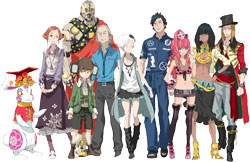In my classes at Monmouth, every now and then I’m introduced to a concept which I already know something of from a video game. I remember last year, in Dr. Patten’s intro to political science course, when he explained the prisoner’s dilemma to us. I was already familiar with the concept thanks to Zero Escape: Virtue’s Last Reward, and this helped my group to avoid a potential 10-year prison sentence in our exercise.
Before I get into this though, let me just add a quick disclaimer: if you hear something in a video game that interests you, you should research it independently; it doesn’t have to be extensive, but be sure at least give it a quick google. Most games are works of fiction, and often they take creative license, even when they present something as factual. To illustrate this: in the video game Nine Hours, Nine Persons, Nine Doors, a curious incident involving chemistry is discussed. According to the game, in 1920, due to an accident involving the transport of liquid glycerin, a sample of glycerin crystallized. This was curious because glycerin had never been crystallized before, and afterwards glycerin everywhere started to crystallize spontaneously.
To call this story about glycerin half-true would be giving it too much credit; some research was done on the crystallization of glycerin in the 1920’s, but that’s about all the truth there. However, due to the game’s presentation, this story actually fooled a good number of people. Many players thought the game was summarizing a historical event, when in actuality the game was combining a semi-popular occult myth with the plot of Cat’s Cradle, a popular Kurt Vonnegut novel. Nine Hours, Nine Persons, Nine Doors is highly regarded for having a story made up of interesting facts and compelling fiction; unfortunately, as has been illustrated, occasionally the two blend together.
If you’re at all interested in psychology, then recent titles in the Persona series are must-plays. I’ve found that this series does an excellent job of stimulating one’s interest in psychology; the plot is interesting enough that when the game touches on a concept, you’ll want to know more about it. Much of the game’s psychological content is under the surface. For example, Persona 3’s protagonist is motivated by the Freudian death drive/Thanatos drive. I wouldn’t have picked up on this fun fact had I not taken a class on psychology prior to playing Persona 3. One of Persona’s best features is its psychologically complicated characters; Naoto, from Persona 4, was designed around the idea of being psychologically androgynous. Even the game’s title is rooted in psychology; the word “persona” is Latin for mask, Carl Jung, a prominent psychologist, used it to refer to the social masks that we show to others. Persona 3 Portable features dual protagonists inspired by the Jungian archetypes of anima and animus.
Not only is the game’s core narrative built around psychology, but over the course of a Persona game, players will actually receive lectures on psychology in-game. One of the Persona 3’s characters, Mr. Edogawa, actually lectures you on Jungian psychology. In Persona 4 Golden, players can access a number of Mr. Edogawa’s lectures separate from the main storyline; additional lectures, relevant to whatever part of the storyline you’re at, are added as you play the game. While perhaps not as comprehensive as one of Dr. Stapley’s lectures, these do a good job of summarizing Carl Jung’s ideas.
Moving on to history, the popular Assassin’s Creed series can be surprisingly informative. It tends to take a rather pessimistic view of history and presents people and organizations as rather selfish; interestingly enough, if you go to a history class after playing an Assassin’s Creed game, you’ll find that this is an effective lens to use. Over the course of an Assassin’s Creed game, one will meet various historical figures, travel through historical cities, and experience historical events. There are plenty of opportunities to learn, and if you’re interested in history, much to appreciate. Oh, and that disclaimer I mentioned earlier? Since Assassin’s Creed consists of interwoven factual history and fictional narrative, my disclaimer goes double here—don’t take anything you hear in an Assassin’s Creed game as factual until you’ve verified it yourself.
Last but not least is the Zero Escape series; this is probably the most educational video game series I have played to date. There have been two titles released in this series: Nine Hours, Nine Persons, Nine Doors and Zero Escape: Virtue’s Last Reward. The gameplay style is visual novel and puzzle, and each complements the other nicely. The puzzle aspect of gameplay puts you in a series of locked rooms, and as the player, you have to solve each room’s puzzle and escape. The visual novel element makes the game feel almost like a book; you’ll do a lot of reading, absorbing facts, and will occasionally have to make decisions. Decisions are typically either puzzle-related (academic) or social (you have to occasionally make judgements about the game’s characters).
Knowledge that you obtain from the visual novel portion is often the key to solving Zero Escape’s puzzles. The visual novel component typically introduces and explains a concept, and in one case this was the idea of a digital root. To calculate the digital root of a number, you have to add its digits together until you get a single-digit number; for example, the digital root of 27 would be 9 (2+7=9), or for 29, 1 (2+9=11, 1+1=2). The game’s puzzles then proceed to hammer these concepts into your head; you may be given a series of numbers, and told to use no more than three of them to achieve a digital root of seven. I’ve personally found games that teach me something to hold my interest longer than the others.
Before I finish, I’d just like to point out that all of the games listed here are normal games; none of them are marketed as belonging to the genre “educational video games.” Video games that have been made purely for the purpose of being educational don’t seem to have caught on. Clearly not all games have educational value, and there’s nothing wrong with that; that said, to me at least, that there’s something appealing about learning and relaxing at the same time.
IMAGE TAKEN from zeroescape.wikia.com




